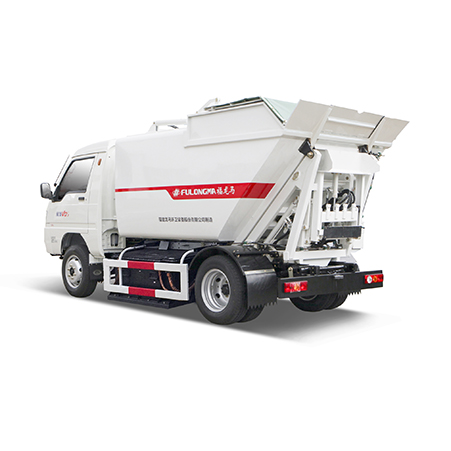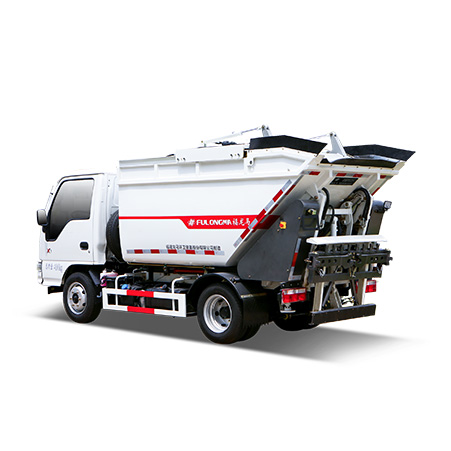Urban waste management is a critical aspect of maintaining clean, healthy, and sustainable cities. With the rapid growth of urban populations, the amount of waste generated is increasing at an unprecedented rate. Efficient waste management is essential to ensure that cities remain livable, reducing the environmental impact of waste and preventing public health issues. Traditional waste management methods, while effective in the past, now face significant challenges in terms of efficiency and environmental sustainability. This has led to the exploration of innovative solutions like electric self-loading garbage trucks.
Electric self-loading garbage trucks represent a revolutionary shift in waste management. By leveraging electric power and advanced automation, these vehicles address many of the environmental and operational challenges posed by traditional diesel trucks. They offer a sustainable and efficient alternative, aligning with the growing emphasis on green technology and smart city initiatives.

What are Electric Self-loading Garbage Trucks?
Electric self-loading garbage trucks are waste collection vehicles powered entirely by electricity. They are equipped with automated systems that allow for efficient loading, compacting, and transporting of waste. These trucks use high-capacity batteries and advanced electric motors to perform their tasks, eliminating the need for fossil fuels.
Key Features
- Electric Powertrain: Utilizes electric motors and batteries, reducing reliance on diesel fuel.
- Self-loading Mechanism: Automated loading systems that streamline the waste collection process.
- Advanced Battery Systems: High-capacity batteries that provide extended range and efficiency.
- Smart Technologies: Integration of GPS, telematics, and route optimization software.
Electric Self-loading Garbage Trucks Benefits
Reduced Emissions
One of the most significant benefits of electric self-loading garbage trucks is the reduction in emissions. By eliminating the use of diesel fuel, these trucks produce zero tailpipe emissions, drastically cutting down on CO2, NOx, and PM. This reduction in emissions is crucial for improving urban air quality and combating climate change.
Energy Efficiency
Electric garbage trucks are inherently more energy-efficient than their diesel counterparts. Electric motors convert a higher percentage of energy from the battery to movement, while diesel engines lose much of their energy to heat. Additionally, features like regenerative braking capture and reuse energy that would otherwise be lost, further enhancing efficiency.
Waste Management and Recycling
Electric self-loading garbage trucks can be equipped with advanced sorting and compacting mechanisms, improving waste management processes. Automated systems can help segregate recyclable materials from organic and non-recyclable waste more effectively, supporting recycling initiatives and reducing landfill use.

Operational Efficiency
Operationally, electric self-loading garbage trucks offer several advantages:
- Cost Savings: Lower fuel costs as electricity is generally cheaper than diesel. Reduced maintenance expenses due to fewer moving parts and less wear and tear.
- Enhanced Performance: Quieter operation, reducing noise pollution and enhancing the quality of life in urban areas. Reliable and durable with fewer mechanical failures.
- Smart Routing: Integration with smart city infrastructure allows for optimized routing, reducing unnecessary mileage and improving fuel efficiency.
Conclusion
Electric self-loading garbage trucks are a game-changer in urban waste management. They offer the dual advantage of being eco-friendly and operationally efficient, addressing both environmental and logistical challenges faced by traditional garbage trucks. By reducing emissions, enhancing energy efficiency, supporting better waste management, and cutting operational costs, these trucks represent a sustainable and forward-thinking solution for cities worldwide.
The transition to electric self-loading garbage trucks not only aligns with global sustainability goals but also promotes cleaner, quieter, and more efficient urban living. As cities continue to grow and evolve, embracing such innovative technologies will be crucial in building resilient, sustainable urban environments for future generations.
FAQs
How do electric self-loading garbage trucks benefit the environment?
They reduce greenhouse gas emissions, lower noise pollution, and use energy more efficiently compared to traditional diesel-powered trucks.
Are electric self-loading garbage trucks cost-effective?
Yes, despite higher initial costs, they offer long-term savings through lower fuel expenses, reduced maintenance costs, and potential government incentives.
What challenges do municipalities face in adopting electric self-loading garbage trucks?
Challenges include the higher upfront investment and the need for charging infrastructure, but these can be mitigated through financial incentives and strategic planning.






